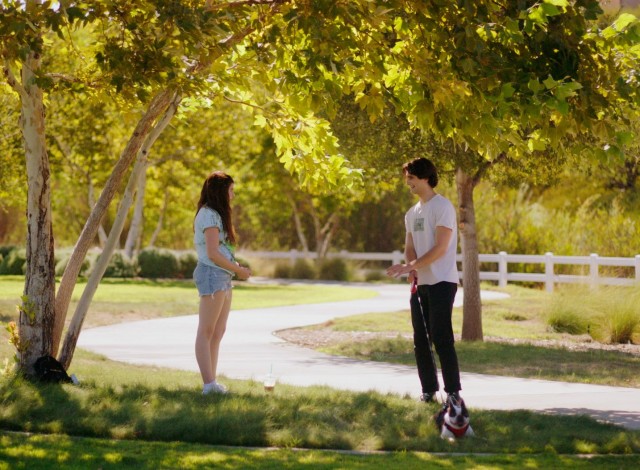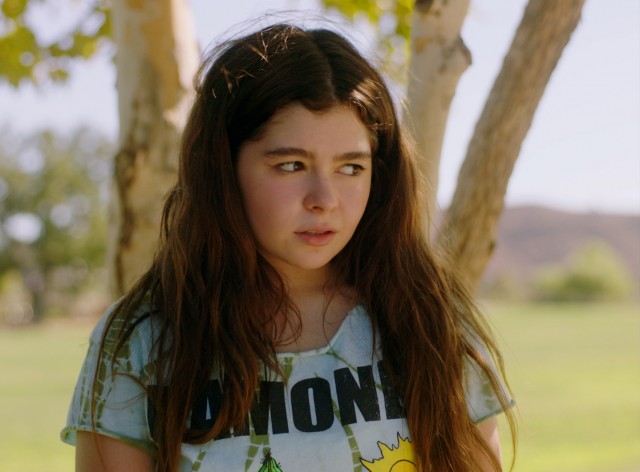Zane Rubin’s Maddie starts out in a slightly dreamy mood, immersing its audience alongside the film’s titular teenage protagonist. Her preoccupations seem to be typical for a girl her age: she watches the videos of a boy/influencer she adores on her phone and in true TikTok fashion tries to emulate his moves, which are affectedly sexualized. Reality hits Maddie in the form of a Boston terrier and its owner, J.J. When the college student starts making conversation, a comment about her shirt soon leads to an invitation to his house. Although he remarks on their age difference, he doesn’t seem to be too bothered by it, but Maddie is more unsure of the entire ordeal, following him out of seeming curiosity and some kind of shame of telling the guy off.
“You’re young and you want attention from boys so badly that you accidentally find yourself in a position you wish you hadn’t”
The uncomfortable atmosphere of what unfolds next is better seen than described, but it’s safe to say that for all its tension, nothing in the short feels out of the ordinary or exaggerated. What probably lingers most for Maddie is how the experience changes her view on perceptions she thought she had just an hour or so ago.
Writer/director Zane Rubin describes MADDIE as a film which “sets out to explore an experience almost every female has had: You’re young and you want attention from boys so badly that you accidentally find yourself in a position you wish you hadn’t.“
This sentiment describes the dichotomy that Addison Riecke’s main performance captures. The former child actress (Nickelodeon’s The Thundermans) portrays Maddie as a teenage girl who is caught between her own desire to seem mature and her childish innocence, without ever making her seem overly naive. Riecke’s countenance adheres to the character’s unwieldiness in order to channel an inner conflict that feels unsure and restrained like Maddie herself. Yet her simmering nervousness always hints at the potential for an intense emotional reaction, one she’s fighting to keep under guard.

Addison Riecke (L) and Larson Rainier as Maddie and J.J. as they meet in the park
Larson Rainier has a similarly difficult job in the role of J.J., a man who is clearly misbehaving, but isn’t caricatured as an evil monster. He even comes across as a bit insecure himself, although his intentions are questionable from the get-go. Drew Scheid rounds out the cast as the apparently “nice guy“ who still gets cast in a shady light, simply by proxy, and provides one last spin to the story that leaves a very strange aftertaste.
We’ve been following Zane Rubin’s work for a while now at S/W and I always find it interesting when a filmmaker cultivates a unique style and then expands on that promise within these specific artistic sensibilities, thus creating a link between their previous output and elevating the next step in their career. Which is exactly how I feel about Maddie.
While Rubin’s previously featured shorts (The Last Virgin in LA, A Good Dinner Party) saw the filmmaker cast herself in front of the camera and apply a particular awkward humor to stories that dealt with topics connected to sexuality, her latest film builds on the foundation of her creative point of view with additional range. Even without her presence on screen, Maddie still feels unmistakably her own.
The slightly heightened perception of reality in her precursors make room for what I’d like to coin as “Californian naturalism,” which connects to the rest of her oeuvre through a distinct low-key vibe that focuses on a constrained premise which insinuates the larger framework around it. Like her other films, Maddie again centers on matters of sexuality and an inability to adequately handle the overextending situation. But this time, Rubin’s trademark self-irony and winks at the audience are exchanged for a more somber, ambivalent tone.

Addison Riecke plays the titular teenager in Zane Rubin’s Maddie perfectly.
It is one of the biggest strengths of the short that it manages to establish an uncomfortable tension throughout the film without feeling too overwhelming or heavy-handed. This doesn’t mean that Rubin takes the story and its themes lightly. On the contrary, her direction feels confident in its serenity. The situation is clearly distressing, but it could have been staged in a much more obvious way.
Through Rubins approach, the cinematic execution reflects Maddie’s perplexed state–she still can’t fully grasp what has happened; the sun is still shining and everything seems like before, but it won’t be the same for her. We connect to Maddie’s malaise exactly because the film doesn’t spell out her distraught emotions for us. There certainly have been films that have dealt with this topic in a more disturbing or impactful way, but it it takes a specific skill set to find the right balance between a meaningful subject matter and a more casual slice-of-life approach like Rubin does here.
The filmmaker is currently in the process of getting a feature off the ground, in a similar vein as Maddie, it revolves around a 30-something mother who’s world is turned upside down when the school calls to tell her that her that her teenage son has been accused of sexual assault. More akin to her earlier work, the filmmaker is also writing a new movie with her partner and frequent collaborator Chris Levitus, this one about a teenage girl who becomes convinced the boy she likes possesses environmental powers.

 Georg Csarmann
Georg Csarmann